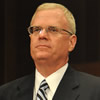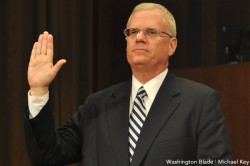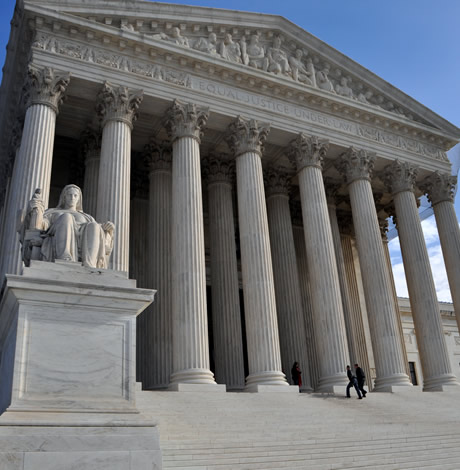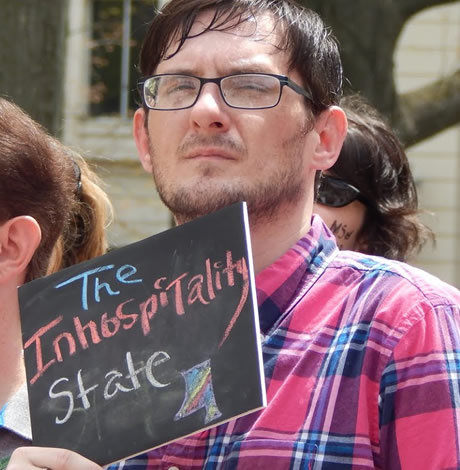National
Senate confirms gay nominee to Calif. federal court
Fitzgerald approved by vote of 91-6

The Senate on Thursday confirmed to the bench a gay judicial nominee whom Republicans had held up for four months from receiving a floor vote along with other appointees.
Michael Fitzgerald, whom President Obama nominated for a seat on the U.S. District Court for the Central District of California in July, was approved by a vote of 91-6. A simple majority was required for confirmation.
The six senators who voted “no” were Roy Blunt (R-Mo.), Jim DeMint (R-S.C.), James Inhofe (R-Okla.), Mike Lee (R-Utah), Rand Paul (R-Ky.) and David Vitter (R-La.). Not voting were Sens. Lamar Alexander (R-Tenn.) and Orrin Hatch (R-Utah) as well as Mark Kirk (R-Ill.), who’s been recovering from a stroke.
“I am honored by the Senate’s confirmation vote today,” Fitzgerald said in a statement. “I am grateful to the President for my nomination. I am grateful to Senator Boxer for her recommendation of me to the President. I am grateful to Senator Feinstein for her support in the Senate Judiciary Committee. I look forward to serving the people of the Central District of California.”
The Senate Judiciary Committee reported out his nomination in November unanimously by voice vote to the Senate floor, but his confirmation has been held up along with other nominees.
Barbara Boxer (D-Calif.), who recommended the Fitzgerald nomination, spoke highly of him on the Senate floor prior to the vote as she chided Republicans for holding up his confirmation.
“He is an historic choice, and a vote of Mr. Fitzgerald’s nomination is long overdue, because he was voted out of the Senate Judiciary Committee unanimously 133 days ago, on Nov. 3, 2011,” Boxer said. “It really shouldn’t take this long to confirm such a highly-qualified nominee like Mr. Fitzgerald, especially because this seat has been designated a judicial emergency.”
According to Boxer’s office, former President George W. Bush’s district court nominees waited an average of 22 days as of March 2004 for confirmation after being reported out by the Judiciary Committee. Comparatively, President Obama’s district court nominees have waited an average of 93 days. Fitzgerald has waited 132 days for a vote on his nomination.
Fitzgerald was among 17 nominees pending before the Senate on which Senate Majority Leader Harry Reid (D-Nev.) filed cloture Monday as a result of Republicans objecting to floor votes on their confirmation. But as a result of a deal that was reached on Wednesday, Democrats and Republicans will move 12 district court judges and two circuit court judges through the confirmation process by May 7. Fitzgerald’s vote was locked in Thursday under the agreement.
LGBT advocates praised the confirmation of Fitzgerald and said his previous work over the years as an attorney makes him qualified for the position on the bench. Fitzgerald has had experience in private practice in addition to working as a U.S. attorney.
Chuck Wolfe, CEO of the Gay & Lesbian Victory Fund, said Fitzgerald’s legal experience “makes him an excellent choice for the federal bench.”
“He joins a still very small but growing group of openly LGBT federal judges, and we commend the Obama administration for making sure these esteemed positions are open to all qualified Americans, regardless of sexual orientation or gender identity,” Wolfe said.
Joe Solmonese, president of the Human Rights Campaign, said he applauds for the Senate for the confirming Fitzgerald — calling him “eminently qualified nominee” — as he took a jab at Republicans for holding up the nomination for so long.
“We are disappointed that it took months for the Senate to consider his nomination because Republican leadership has been refusing to give President Obama’s judicial nominees a timely up or down vote,” Solmonese said.
Michael Fleming, executive director of the David Bohnett Foundation and longtime friend of Fitzgerald’s, also had good things to say about the new judge upon his confirmation.
“I’ve known Michael for years and no one better embodies the qualities we seek to find in all of our judges — wisdom, honesty and integrity,” Fleming said. “There’s a reason why he was nominated by the president and why he has sailed through this process with such ease — because he has the skills and strengths to be a great judge.”
Lorri Jean, CEO of L.A. Gay & Lesbian Center, also said she’s known Fitzgerald for many years and believes he’ll serve the country with honor.
“I’m grateful to the President and the Senate for appointing a judge who brings to the bench not only a keen intellect, a wealth of legal experience and strong ethics, but life experience as a gay man,” Jean said. “It’s essential to have sexual orientation and gender identity diversity on the bench for the same reason it’s important to have racial and gender diversity in the judiciary; the life experience of judges provides valuable insight, and influences, their interpretation of the law. As Supreme Court Justice Sonia Sotomayor once said, ‘Personal experiences affect the facts that judges choose to see.’”
Congratulations also came from the White House.
“The president welcomes the confirmation of Michael Fitzgerald,” said White House spokesperson Shin Inouye. “He will serve the American people well on the U.S. District Court for the Central District of California.”
Fitzgerald was given a review by the American Bar Association, which gave him a rating of “unanimously well-qualified.”
Most recently, Fitzgerald worked at Corbin, Fitzgerald & Athey LLP in 1998, but prior to that experience, he worked at the Law Offices of Robert L. Corbin PC and at the law firm of Heller, Ehrman, White & McAuliffe.
The new judge also served as an assistant U.S. Attorney in Los Angeles, where he handled criminal cases, such as a drug and money laundering case involving what at that time was the second-largest cocaine seizure in California.
In his questionnaire response to the Senate Judiciary Committee, Fitzgerald wrote that he has participated in some LGNT activism, including the 2008 campaign against Proposition 8 as a door-knocker. Fitzgerald is also a member of the Harvard-Radcliffe Gay & Lesbian Caucus. From 2007 to 2008, he served on the leadership task force for the L.A. Gay & Lesbian Center. In the 1990s, he was a member of the Stonewall Democratic Club.
Fitzgerald isn’t a stranger to represent client in cases related to LGBT rights. He was involved in the settlement of Buttino v. FBI, the 1993 class-action lawsuit involving Frank Buttino, a gay FBI specialist who was anonymously outed to his superior, resulting in the removal of his security clearance and subsequent firing. Fitzgerald asked his law firm at the time to represent Buttino on a pro bono basis.
As a result of the settlement, the FBI renounced its prior policy of viewing homosexuality as a negative factor in regard to security clearances, the FBI agreed to hire an openly lesbian special agent and Buttino’s pension was restored.
Fitzgerald is the fourth out federal judicial nominee chosen by the White House, but third one to receive confirmation from the Senate. Fitzgerald’s confirmation makes him the first openly gay federal judge to serve in California.
In July, the Senate confirmed J. Paul Oetken to the U.S. District Court of Southern District of New York, making him the first openly gay male to sit on the federal judiciary. In October, the Senate confirmed lesbian Alison Nathan to the same court.
Another one of Obama’s gay judicial nominees, Edmund DuMont, was withdrawn after he asked the White House to remove him from consideration. DuMont was first nominated on April 14, 2010, but his nomination languished for more than 18 months without the taking Senate taking action. He was nominated the U S. Court of Appeals for the Federal Circuit and would have been the first openly gay federal appellate judge.
U.S. Supreme Court
Concern over marriage equality in US grows two decades after first Mass. same-sex weddings
Gay and lesbian couples began to marry in Bay State in 2004

Two decades after Massachusetts became the first state to legalize same-sex marriage, a new study reveals both significant progress and ongoing challenges for married LGBTQ couples in the U.S., with a growing sense of insecurity about the future of their rights.
The Williams Institute at UCLA School of Law surveyed 484 married same-sex couples from all 50 states and D.C. The study, released Monday, marks the 20th anniversary of legal same-sex marriage in the U.S.
Researchers found that 93 percent of respondents cited love as a primary reason for marrying, with 75 percent also mentioning legal protections. Over 83 percent reported positive changes in their sense of security, and 74.6 percent noted improved life satisfaction since marrying.
However, the study also highlighted persistent discrimination and growing concerns about the future. About 11 percent of couples who had a wedding reported facing prejudice during the planning process.
Alarmingly, nearly 80 percent of respondents expressed concern about the potential overturning of the 2015 Obergefell v. Hodges decision, which legalized same-sex marriage nationwide. This anxiety has been exacerbated by initiatives like Project 2025, a conservative policy blueprint that some fear could roll back LGBTQ rights if implemented.
The possibility of a former President Donald Trump victory in the upcoming election has further intensified these concerns. Many respondents cited Trump’s previous U.S. Supreme Court appointments and his statements on LGBTQ issues as reasons for their apprehension. One participant stated, “The thought of another Trump presidency keeps me up at night. We’ve come so far, but it feels like our rights could be stripped away at any moment.”
The current political climate has 29 percent of respondents considering moving to another state, with 52.9 percent citing socio-political concerns as a primary reason. This reflects a growing sense of insecurity among LGBTQ couples about their rights and freedoms.
Brad Sears, founding executive director of the Williams Institute, noted, “The data clearly show that marriage equality has had a profound positive impact on same-sex couples and their families. However, it also reveals ongoing challenges and serious concerns about the future of these rights in light of current political trends and the upcoming election.”
Christy Mallory, legal director at the Williams Institute and lead author of the study, added, “This research provides crucial insights into the lived experiences of same-sex couples two decades after marriage equality began in the U.S. The high level of concern about potential loss of rights underscores the continued importance of legal protections and public support for LGBTQ+ equality.”
The study found that 30 percent of surveyed couples have children, with 58.1 percent of those parents reporting that marriage provided more stability for their families. However, many of these families now worry about the security of their legal status in the face of potential policy changes and shifting political landscapes.
As the nation reflects on two decades of marriage equality, the study underscores both the transformative power of legal recognition and the ongoing need for vigilance in protecting LGBTQ+ rights. The findings highlight the complex reality faced by same-sex couples in America today: Celebrating hard-won progress while grappling with uncertainty about the future, particularly in light of upcoming political events and potential shifts in leadership.
State Department
State Department hosts meeting on LGBTQ rights and foreign policy
Event took place before Pride Month reception

Secretary of State Antony Blinken on Thursday hosted a group of LGBTQ activists and politicians from around the world at the State Department.
The event — described as a “Convening on U.S. Foreign Policy: National Security, Inclusive Development, and the Human Rights of LGBTQI+ Persons” — took place before the State Department’s annual Pride Month reception. Participants included:
• Jessica Stern, the special U.S. envoy for the promotion of LGBTQ and intersex rights
• U.S. Ambassador to the U.N. Linda Thomas-Greenfield
• U.S. Trade Representative Katherine Tai
• U.S. Ambassador to India Eric Garcetti
• Suzanne Goldberg, senior advisor to the Under Secretary of State for Civil Security, Democracy, and Human Rights
• Under Secretary of State for Civilian Security, Democracy, and Human Rights Uzra Zeya
• U.S. Agency for International Development Senior LGBTQI+ Coordinator Jay Gilliam
• USAID Counselor Clinton D. White
• National Security Council Senior Director for Democracy and Human Rights Kelly Razzouk
• Assistant U.S. Secretary of Health Adm. Rachel Levine
• National Security Council Human Rights Director Jess Huber
• U.N. Assistant Secretary General for Human Rights Ilze Brandt Kehris
• Icelandic Ambassador to the U.S. Bergdís Ellertsdóttir
• Council for Global Equality Co-Executive Director Mark Bromley
• Outright International Senior Advisor for Global Intersex Rights Kimberly Zieselman
• Essy Adhiambo, executive director of the Institute for Equality and Non Discrimination in Kenya
• Pau González, co-chair of Hombres Trans Panamá and PFLAG-Panamá
“Forty-five years ago, thousands gathered in D.C. in what became the first national march for LGBTQI+, demanding their voices be heard,” said Thomas-Greenfield in a post to her X account that showed her speaking at the event. “We must continue to carry forward the spirit of these pioneers and fight for equal rights and dignity for all.”
Forty-five years ago, thousands gathered in DC in what became the first national march for LGBTQI+, demanding their voices be heard.
We must continue to carry forward the spirit of these pioneers and fight for equal rights and dignity for all. 🏳️🌈🏳️⚧️ pic.twitter.com/oph2Ahmfhq
— Ambassador Linda Thomas-Greenfield (@USAmbUN) June 28, 2024
President Joe Biden in 2021 signed a memo that committed the U.S. to promoting LGBTQ and intersex rights abroad as part of his administration’s overall foreign policy.
“LGBTQI+ rights are human rights,” said Blinken. “Our government has a responsibility to defend them, to promote them — here and everywhere.”
Blinken noted consensual same-sex sexual relations remain criminalized in 64 countries, with the death penalty in 11 of them.
He specifically highlighted Uganda’s Anti-Homosexuality Act and Hungarian Prime Minister Viktor Orbán’s government’s “smearing scapegoating, stigmatizing LGBTQI+ persons — vilifying them with degrading labels, denying them equal rights, normalizing violence against them.” (Gay U.S. Ambassador to Hungary David Pressman this month marched in the annual Budapest Pride parade.)
Blinken noted Iraqi MPs earlier this year “passed legislation that punishes same-sex relations with up to 15 years in prison.” He also pointed out that Indonesian lawmakers approved a new criminal code banning extramarital sex.
“In a nation where same-sex couples cannot marry, these laws effectively make all same-sex conduct illegal and they undermine privacy for all Indonesians,” said Blinken.
“We’re defending and promoting LGBTQI+ rights around the world,” he said.
Blinken noted seven countries — Barbados, St. Kitts and Nevis, Antigua and Barbuda, Dominica, Namibia, Singapore, the Cook Islands — have decriminalized consensual same-sex sexual relations over the last two years. He also highlighted Greece, Liechtenstein, and Thailand this year extended marriage rights to same-sex couples, and other countries are banning so-called “conversion therapy.”
“These achievements are possible because of incredibly courageous human rights defenders and government partners on the ground, but I believe America’s support is indispensable,” said Blinken. “When we engage — sometimes publicly, sometimes privately, sometimes both — when we share our own knowledge and experience, we can and we do achieve change.”
Blinken also announced the U.S. now considers sexual orientation and gender identity are part of the International Covenant on Civil and Political Rights that took effect in 1976.
“This is one of the key treaties committing nations to upholding universal rights,” he said.
“In our regular reporting to the council on human rights, we will continue to include incidents of discrimination or abuse committed against LGBTQI+ persons, now with the clear framework of this well-supported interpretation,” added Blinken. “That will further empower our efforts.”
Blinken reiterated this point and the Biden-Harris administration’s commitment to the promotion of LGBTQ and intersex rights abroad when he spoke at the State Department’s Pride Month event.
“Defending, promoting LGBTQI+ rights globally is the right thing to do, but beyond that, it’s the smart and necessary thing to do for our country, for our national security, for our well-being,” he said.
The White House
Jill and Ashley Biden headline White House Pride celebration
First lady celebrated historic pardons of LGBTQ veterans

First lady Jill Biden and the president and first lady’s daughter, Ashley Biden, headlined the White House Pride celebration on the South Lawn on Wednesday, followed by a performance by singer and actress Deborah Cox.
“My dad has built the most pro-equality administration” in history, Ashley Biden said, crediting the work of LGBTQ people of color like Marsha P. Johnson, a prominent figure in the Stonewall uprising of 1969, as well as “so many of you [who] have continued to lead their fearless fighting against against injustice here and around the world.”
She introduced her mother as “the woman who taught me to be myself up showed me in so many ways how I can make a difference” and who “works every single day, tirelessly, to ensure that all people have the opportunities and freedoms that they deserve.”
“I hope that all of you feel that freedom and love on the South Lawn today,” Jill Biden said.
Her remarks were briefly interrupted by a protestor’s chants of “no Pride in genocide,” which was drowned out by chants of “four more years.”
The first lady noted how many of the attendees came “here from states that are passing laws targeting LGBTQ Americans.”
“There are those who see our communities and our families and wish to tear them down,” she said, “those who can’t see that the world is so much bigger and [more] beautiful than they know — but when our homes are threatened, when they strip away our rights, and deny our basic humanity, we say, ‘not on our watch.'”
“Pride is a celebration, but it is also a declaration,” the first lady said, highlighting the U.S. Supreme Court’s ruling in Obergefell v. Hodges nine years ago, which established marriage equality as the law of the land.
She then credited the accomplishments of the Biden-Harris administration on matters of LGBTQ rights, including the repeal of the previous administration’s ban on military service by transgender servicemembers and the FDA’s loosening of restrictions on blood donation by gay and bisexual men.
The first lady also celebrated the president’s announcement earlier on Wednesday that he will pardon LGBTQ veterans who were discharged and court martialed because of their sexual orientation or gender identity.
“We will never stop fighting for this community,” she said.

-

 Canada1 day ago
Canada1 day agoToronto Pride parade cancelled after pro-Palestinian protesters disrupt it
-

 Theater5 days ago
Theater5 days agoStephen Mark Lukas makes sublime turn in ‘Funny Girl’
-

 Baltimore4 days ago
Baltimore4 days agoDespite record crowds, Baltimore Pride’s LGBTQ critics say organizers dropped the ball
-

 Sports4 days ago
Sports4 days agoHaters troll official Olympics Instagram for celebrating gay athlete and boyfriend








